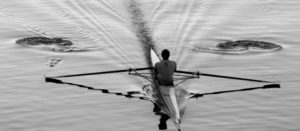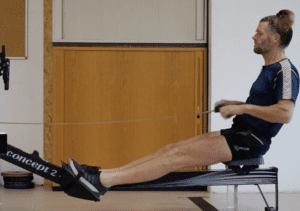A while ago my young son asked me what I wanted for my birthday. Point-blank I told him I want “SPEED!” Lots of speed. A big package of speed . . . as much speed as he could possibly find. Forget the ribbon, no card needed. Just give me tons and tons of speed. Bring it on, as much as you can . . . give me speed.
The reason why? I’m a crew coach. I love speed . . . I want to be fast!
For many of us the term “fast” means one thing, and one thing only — the speed that is generated as a boat moves through the water. But that’s really a very limited view. The new economy and the quickly changing business environment dictates we look at the term fast differently. In the business world, a fast company is one that quickly adapts to changes. A fast company can also recruit people, and once those people are working it retains those employees in a very competitive market place. In the broadest sense, all three definitions apply to a rowing program.
In the next three articles, we will be looking at just how fast your program is. The first article, this one, deals with judging the speed of a shell. The second will focus on how well your coaches and program adapt to change. The final article will spotlight how appealing your program is to those inside and outside of it. Together these three articles should help you determine just how fast you are.
Judging Speed
For rowing coaches, speed is our Holy Grail. It is that elusive item we seem to spend hours, days, weeks, months, and years chasing. Interestingly enough, when we do find it we usually are not satisfied, and want more. I am not positive, but I would suggest that the speediest of coaches over the past three years, Mike Teti, is not satisfied with the speed his boats generate, and wants more, and more, and more.
Speed is nothing more than the quality of being fast. Suggesting that speed can be very difficult to judge is an understatement, and more than one coach has lost a good night’s sleep over how fast a shell is. But before you have one more sleepless night you should know there are several different ways to tell the speed of a boat.
Gut Instinct
Deep down inside there lives a little voice that talks to us — its called instinct. Its the same voice that tells us little tidbits like “It’s probably not a good idea to put that power megaphone up to your boss’s ear, slide the button to siren and turn it on.”
Instinct is also the same voice that can give you an idea of how much speed a boat has.
Allen Rosenberg, past US National Team coach and coach of the men’s gold medal eight at the 1964 Olympics, relies heavily on his instinct. Rosenberg notes, “Judging a boat’s speed is a feeling, triggered by what my eye tells me. When I look at a boat, I look at it with a fuzzy eye, so that I can take in the whole picture, like you might look at a painting in a museum. I try to see, but not to focus. This helps me see the boat move through the water, and helps me to judge the speed.”
Its important to note that it takes time to develop this eye for judging. Rosenberg suggests that good judging comes with patience and experience. “As coaches we know it takes time for a rower to develop a skill — the same is true of coaches. It will take time and experience for you to develop your speed-instinct.”
Distance
Another method of measuring the speed of a shell is by timing how long it takes a crew to row a set distance. Karin Hughes, assistant Women’s Rowing Coach at the United States Naval Academy, uses two points along the shore to help her judge a crew’s speed.
“We have two trees we use. We time how long it takes a boat to row hard from the green fluffy tree to the purple fluffy tree. We then have them turn around, rowing the same distance again in the opposite direction.” Hughes uses this method to tell what the impact a different rower, or a different rig, may have on a shell’s speed.
Although there are advantages to this method of measuring speed such as being inexpensive, wind and current can work against, or with, a crew to make it difficult to get an accurate estimate of speed. Hughes notes “The conditions are the reason why we do pieces in both directions. We average the time between the two pieces and this helps us get a fairly good view of how fast we are, or are not.”
Technology
A recent development in the determination of hull speed is the use of performance monitors. One of the top brands on the market is Nielson-Kellerman’s SpeedCoach. Simple to install and fairly easy to use, it can give you an accurate judge of a crew’s speed almost instantaneously.
Kevin Sauer, head coach of the University of Virginia’s Women’s Crew uses the SpeedCoach. “Measuring our speed with it allows us to judge the way something may impact a boat’s speed. We can switch rowers, change lineups or change rowers, or experiment with different rigging numbers or different hulls to see which ones help us get the most speed. It is great to have a tool that can give you a speed readout quickly and easily.”
Performance monitors are not cheap, and they can get lost by absent minded coxswains or coaches. But if you are looking for a precise method of measuring speed a monitor might be just what you are looking for.
Racing
Finally, this brings us to what many coaches consider the ultimate judge of speed — racing. Is racing a good way to judge the speed of a boat? Maybe yes, maybe no. Often times the boat speed generated in a race may not reflect a boat’s true speed. Lack of experience can keep a crew from performing at its best. So can how a race plays out. Crews who find themselves ahead against a weaker opponent may row slower than they could if pushed, and crews who find themselves significantly behind in a race may get discouraged, also rowing slower.
Nerves also have been known to cause a crew to row slower. Steve Fairbairn, widely regarded as one of the world’s best coaches, noted, “The anxiety to win a race is very apt to defeat its object and make the oarsman rush and scramble.” Yet, on the other hand, the adrenal rush of competition can sometimes help crews row faster than they do in practice. With all that to consider, racing may be a better way to judge the character of a crew, rather than its speed.
So there you have it, now go judge away. But be mindful of one thing, regardless of how much speed you find in your shell somewhere, some place there is probably someone who can generate more than you.
More to come next week . . .







